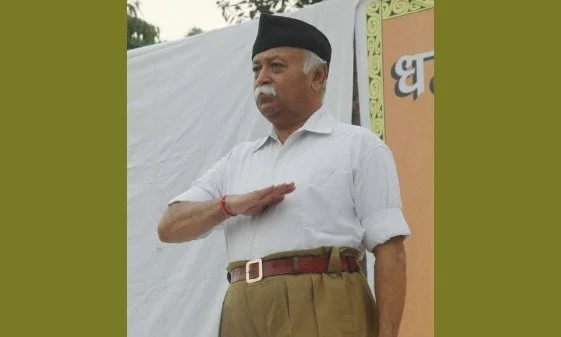Prime Minister’s Praise for Bhagwat Blurs Line Between State and Ideology
Tribute to Mohan Bhagwat Seems to Present RSS Milestones as Part of National Identity
September 11, 2025
Mohan Bhagwat, chief of the RSS. Photo by Vishal Dutta, licensed under Creative Commons.
Prime Minister Modi marked the 75th birthday of Mohan Bhagwat, head of the Rashtriya Swayamsevak Sangh (RSS), with a newspaper tribute calling his tenure the most transformative in the RSS’s 100-year history. This links the authority of the Prime Minister’s office with an unelected ideological group, and therefore raises concerns about political neutrality, ethical conduct and the symbolism of state alignment with a single worldview.
By calling Bhagwat’s tenure the most transformative in the RSS’s history, the Prime Minister appears to suggest that the organisation’s milestones are part of the national narrative.
The ethical concern here relates to political representation. The Prime Minister heads a government that serves a religiously, culturally and ideologically diverse population. Political theorists call this responsibility representative neutrality, meaning that state leaders must show equal respect to all groups. The tribute sends a message to those outside the RSS, leading them to question whether the country’s top office is committed to inclusivity.
From a political communication perspective, publishing the article in newspapers can turn a personal message into a shared public narrative. People see the Prime Minister’s office aligning with one organisation, and repeated associations like this can create a new normal where the state and its ideological source seem inseparable. Symbolic politics works through repetition and public display, and the tribute becomes one of many acts that link government power with ideological identity.
The move also affects party politics. By presenting Bhagwat as a thoughtful and empathetic leader, the Prime Minister sets a moral tone for those within the ruling party. This strengthens loyalty among party workers and tells voters that supporting the RSS means supporting national strength. It limits space for internal dissent and tightens ideological control within the BJP. Opposition parties then face a difficult task, as any criticism of this mix of state power and organisational identity can seem like an attack on cultural tradition, which carries political risk in India.
In institutional terms, the tribute points to “party-state convergence,” which means the boundary between government and ideology becoming unclear, often reducing the state’s independence. Under India’s Constitution, the state is expected to serve all communities equally. Here, one worldview is gaining power through the authority of public office.
For citizens, the message affects their trust in public institutions. Those who identify with the RSS may feel affirmed. Others may feel excluded. A state that openly supports one ideology can weaken the sense of equal belonging. In diverse societies, the sense of equal belonging matters as much as policy because it forms the basis for trust in government. That trust is what gives political institutions their legitimacy. Citizens must believe that the state serves everyone equally, without favouring any one community or belief.
The article on Bhagwat appears to be more than a gesture of personal respect. It signals a leadership willing to combine the authority of constitutional office with the moral claim of an ideological figure, calling into question the role and conduct of the Prime Minister’s office.
You have just read a News Briefing by Newsreel Asia, written to cut through the noise and present a single story for the day that matters to you. Certain briefings, based on media reports, seek to keep readers informed about events across India, others offer a perspective rooted in humanitarian concerns and some provide our own exclusive reporting. We encourage you to read the News Briefing each day. Our objective is to help you become not just an informed citizen, but an engaged and responsible one.

